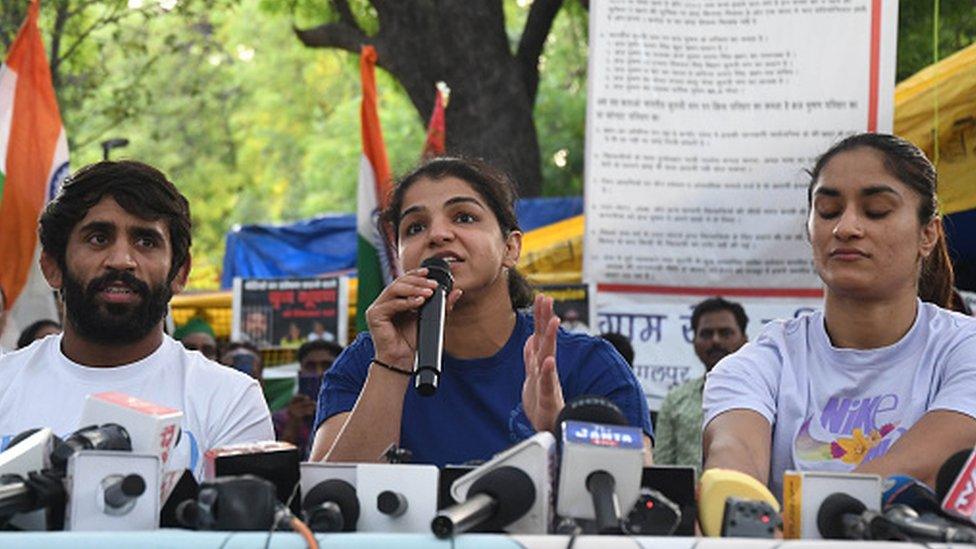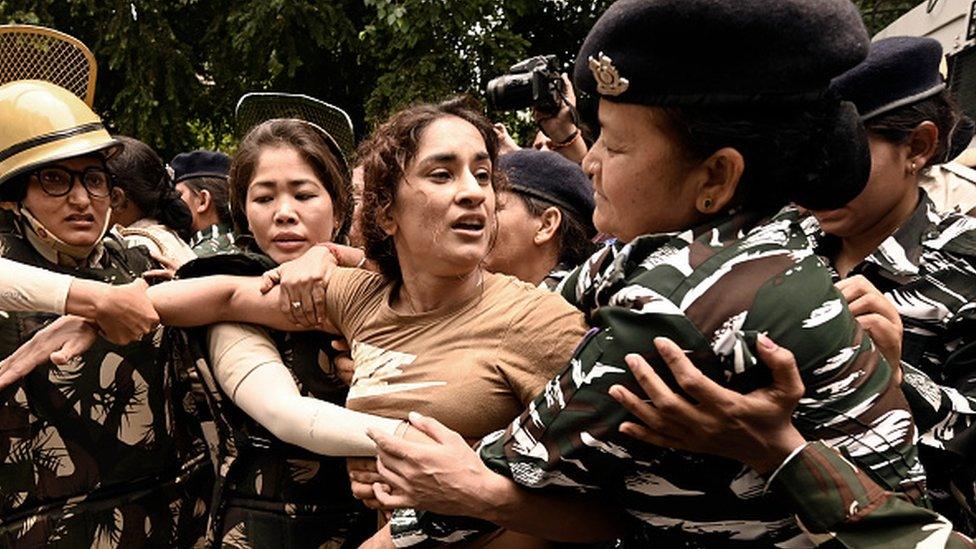India's protesting wrestlers postpone sinking medals in Ganges
- Published

On Sunday, Sakshi Malik, Bajrang Punia and Vinesh Phogat were among several detained by the police
India's top wrestlers have postponed plans to throw their medals into the Ganges, the country's holiest river, as part of their ongoing protest.
They were due to throw the medals in the river on Tuesday afternoon, but have now reportedly given the government five days to respond.
The wrestlers have been demanding the resignation and arrest of their federation chief, whom they accuse of sexually harassing female wrestlers.
He has denied the allegations.
They also plan to go on an indefinite hunger strike at India Gate - a war memorial in capital Delhi.
"These medals are our life and soul... We feel there's no meaning to having these medals around our necks anymore," the wrestlers said in a statement on Tuesday.
Olympic medallists Sakshi Malik and Bajrang Punia and two-time world champion medallist Vinesh Phogat were among the protesters who shared the statement.
There were dramatic scenes as the tearful wrestlers gathered near the river in the north Indian town of Haridwar on Tuesday, but local media said the leader of the influential BKU farming union, met them and convinced them to postpone the protest.
The union leader, Naresh Tikait, was quoted saying the government had five days to take action.
"Because of them, we hold our head high in international sports arena," Mr Tikait told the media.
"We will make sure they won't have to hang their head in shame."
The wrestlers said they had first considered returning their medals to the president and the prime minister but were disappointed that they had not spoken about the protests or enquired about them even once (both leaders have not made any public statements about the protests).
"After we put them [the medals] in the Ganges, there would be no meaning for us to live. So we will got to India Gate and sit on a fast unto death," the statement added.
On Sunday, Malik, Punia and Phogat were among several detained while attempting to march towards India's new parliament building as part of their protest.

Visuals of the athletes being dragged and carried off in buses were widely shared on social media
They were stopped by the police and taken away from the area in buses. The incident took place just a few miles away from the new parliament, which was being inaugurated by Mr Modi at the time.
Visuals of the athletes being dragged and carried off in buses went viral, sparking criticism from top athletes and opposition politicians.
In their statement on Tuesday, the wrestlers decried the police action against them and said they had been treated like "criminals".
"Have female athletes committed some crime by asking for justice for the sexual harassment committed against them?" they asked.
Delhi Police have filed cases including of rioting against the wrestlers. They also cleared out their protest site at Jantar Mantar, a heritage site in Delhi.
The athletes began their protest against Brij Bhushan Singh, the chief of the wrestling federation in India, on 23 April.
Mr Singh, an influential politician and MP of the ruling Bharatiya Janata Party (BJP), has denied all the allegations and called the protests politically motivated. He has been questioned by the Delhi Police, but not arrested yet.
On Monday, sports minister Anurag Thakur said the wrestlers had not been stopped from protesting at their designated spots in Delhi.
He said appropriate action would be taken, external in the case once the Delhi Police completed their investigation. The minister also asked wrestlers who hadn't given statements to the police yet to do so.
BBC News India is now on YouTube. Click here, external to subscribe and watch our documentaries, explainers and features.
